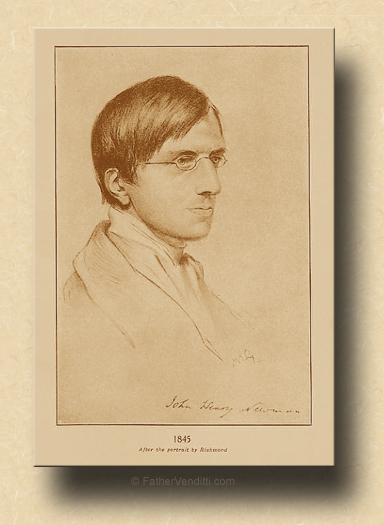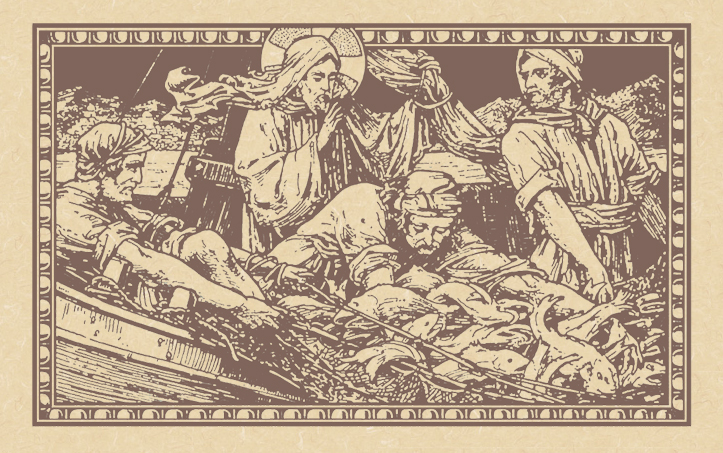Launch Out into the Deep.
The Twenty-Second Thursday of Ordinary Time; or, the Memorial of Saint Teresa of Calcuta, Religious.
Lessons from the primary feria, according to the ordinary form of the Roman Rite:
• Colossians 1: 9-14.
• Psalm 98: 2-6.
• Luke 5: 1-11.
|
If a Mass for the memorial is taken, lessons from the feria as above, or any lessons from the common of Holy Men and Women for a Nun, or the common of Holy Men and Women for Those Who Worked for the Underprivileged.
|
The Third Class Feast of Saint Laurence Justinian, Bishop & Confessor.*
Lessons from the common "Státuit…" of a Confessor Bishop, according to the extraordinary form of the Roman Rite:
• Ecclesiasticus: 44: 16-27; 45: 3-20.
• [Gradual] Ecclesiasticus 44: 16, 20.
• Matthew 25: 14-23.
FatherVenditti.com
|
 4:33 PM 9/6/2019 — Whenever I encounter this passage about the miraculous catch of fish it causes me to reflect on the life of Blessed John Henry Newman, whose works were so influential for me during my seminary years. 4:33 PM 9/6/2019 — Whenever I encounter this passage about the miraculous catch of fish it causes me to reflect on the life of Blessed John Henry Newman, whose works were so influential for me during my seminary years.
Born into an Evangelical Christian family, Newman was later ordained a priest of the Church of England, served as pastor of the university parish at Oxford where he translated and studied the Fathers of the Church, was a principle leader of the "Oxford Movement" (an attempt to "catholicize" the Anglican Church in light of the teachings of the Fathers), and finally became a Catholic. He was so well regarded in his own country that, when he died, the London Times had a bigger spread for him than they had for Queen Victoria just a few years before.
When Newman was in his 20's—around 1830 or so—he made a trip to Italy to see the Catholic Church there. The practice of the Catholic Faith was still restricted in England at the time; and, being a religious man, he wanted to see first hand what it was like. What he saw there horrified him: statues, the veneration of relics, a faith which he thought to be very far removed from the Bible-oriented faith of his youth.
On the trip back, the boat he was riding was becalmed in the Mediterranean for several weeks. He became ill with fever, and began to think about where his life was taking him. Because of his study of the Fathers, he no longer could believe that his own Church of England was the true faith, but he didn't know what was. It was there, on that boat, that he wrote his most famous hymn, which is still sung today in many Protestant churches:
Lead, Kindly Light, amid the encircling gloom—
Lead Thou me on!
The night is dark, and I am far from home—
Lead Thou me on!
Keep Thou my feet; I do not ask to see
The distant scene—
One step enough for me.
Now, if you had been able to go back in your time machine and talk to Newman at that point, and if you had told him that he would die a Cardinal of the Roman Church and a defender of the Catholic Faith, he probably would have committed suicide. But that's exactly what happened. And when he was in his eighties, just a few years before he died, he looked back on his life, and expressed his thoughts in an epic poem called The Dream of Gerontius, a dramatic portrayal of death and judgment, part of which became another famous hymn, which is still sometimes sung in Roman Catholic churches:
Praise the to Holiest in the Height,
And in the Depth be praised:
In all his works most wonderful;
Most sure in all His ways!
 What a statement that is after a life like his: “Most sure in all His Ways!” He could look back on his life, on all the changes he had been through, and all the pain that they caused, and see them as part of a deliberate plan on the part of God to bring him to where he now stood. And yet, during all those difficult years of uncertainty and confusion, God never once revealed to him where He was taking him, or even gave him a hint about it, but rather required him to have faith that He was, indeed, “Most sure in all His ways!” What a statement that is after a life like his: “Most sure in all His Ways!” He could look back on his life, on all the changes he had been through, and all the pain that they caused, and see them as part of a deliberate plan on the part of God to bring him to where he now stood. And yet, during all those difficult years of uncertainty and confusion, God never once revealed to him where He was taking him, or even gave him a hint about it, but rather required him to have faith that He was, indeed, “Most sure in all His ways!”
Peter must have felt the same kind of thing in the event which is described in our Gospel lesson for today. Jesus knew from the beginning what Peter would eventually be and what role he would play in establishing the Church, but Peter didn't know it. Peter had to grow first. And Jesus took him through it, deliberately and painfully, “Most sure in all His ways!” But He knows that Peter is confused and hurting about it, and wants to console him in a cryptic way without revealing the answers, as He so often does; so after He's finished preaching to the crowds, He rows out with Peter into the lake, and utters some of the most electrifying words in all Scripture: "Launch out into the deep, and throw out your nets." And Peter reacts the way all of us would: "What's the point? There's no fish out here. We've been at it all night and haven't caught a thing!" And Jesus just says, "Launch out into the deep.”
And the miraculous catch of fish that Peter makes is a symbol, intended for us as well as for him. No! We don't know what's going on. We don't know where we're going, or perhaps even where we've been. But Jesus does. It's part of His plan. And believing that means, first of all, letting “one step” be enough, and then, allowing Him to be “Most sure in all His ways!” And that's why Peter's reaction to this strange command is important for us. He says, "We've worked hard all night, and caught nothing; but, because You say so, I will let down the nets." Not because I agree, not because I understand, not because I'm not concerned, not because I think You're right, but only because I trust You—because You say so. That's enough. And that's why Peter passes the test of an Apostle.
Everyone’s life is filled with uncertainty of some kind. Some of us are uncertain about our health, some about their financial situation, or maybe about a relationship, or perhaps even some crisis of faith. I know that some of us are unsettled and unsure even about things the Holy Father is saying and doing. For everyone the future is dark at some point. And that uncertainty is not easy to live with, and it can try our faith tremendously. We don't know, sometimes, what the Lord is doing to us, or why. But He understands that, and He commands us to "launch out into the deep.” And the test of Christian maturity is to have enough faith to believe that, even if we don’t know where we’re going, He does, because He is “Most sure in all his ways!”

* Laurence Justinian, born of the noble family of Giustiniani (anglicized as "Justinian") was the first Patriarch of Venice. He died in 1455.
|

